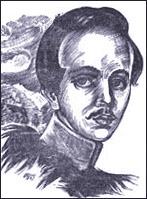|
Behold late even and a hut,
A youthful Slavvess there; and lo,
The blood-red strip afar doth cut
The earth and sky with fiery glow...
And making her babe's cradle swing,
The Slavvess young doth sadly sing...
"Cry not, cry not! or is thy heart
So full with an approaching ill?..
Not yet hath come the time to start:
Abandon thee I never will.
I'd sooner see my husband die.
My child, cry not! or I shall cry!
Thy father Tartars fights mid those
Who stand for honour and for God;
His shiny blade for many rose,
A bloody pathway he hath trod.
Come take a look, the sky groweth red:
There fighting soweth seed of dread.
How glad I am that thou art young
And cannot understand thy plight!
His hands no child hath ever wrung
From loss or shame or fear of might;
Who would not have their blissful lot..."
But mark, – a warrior is in the cot.
Rent his cuirass, blood on his brow.
" It hath!.." his cry the air clove,
" ... Hath come about! ye, cursed, crow!
Enslaved are lands we used to love;
Could not our swords the Tartars fend –
The Horde hath gained the upper hand."
He droppeth down. From past bloodshed
Thus taketh he a fighter's death.
And up above the lifeless head
The wife then lifteth the child and saith:
"Look at thy father's bloody chest; –
To avenge wilt learn by mother's breast!.."
This translation was edited by Irina Kadis.
|
В избушке позднею порою
Славянка юная сидит.
Вдали багровой полосою
На небе зарево горит...
И, люльку детскую качая,
Поет славянка молодая...
"Не плачь, не плачь! Иль сердцем чуешь,
Дитя, ты близкую беду!..
О, полно, рано ты тоскуешь:
Я от тебя не отойду.
Скорее мужа я утрачу.
Дитя, не плачь! И я заплачу!
Отец твой стал за честь и бога
В ряду бойцов против татар,
Кровавый след ему дорога,
Его булат блестит, как жар.
Взгляни, там зарево краснеет:
То битва семя смерти сеет.
Как рада я, что ты не в силах
Понять опасности своей,
Не плачут дети на могилах,
Им чужд и стыд и страх цепей,
Их жребий зависти достоин..."
Вдруг шум – и в двери входит воин.
Брада в крови, избиты латы.
"Свершилось! – восклицает он. –
Свершилось! Торжествуй, проклятый!..
Наш милый край порабощен,
Татар мечи не удержали –
Орда взяла, и наши пали".
И он упал – и умирает
Кровавой смертию бойца.
Жена ребенка поднимает
Над бледной головой отца:
"Смотри, как умирают люди,
И мстить учись у женской груди!.."
1831
|

